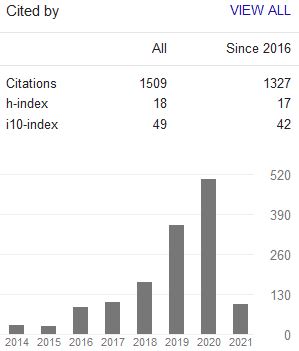THE CONCEPT OF MAN IN AHMAD ASRORI’S ANTHROPOLOGY OF TASAWUF
Abstract
Keywords
Full Text:
PDFReferences
Abidin, Zainal. Filsafat Manusia: Memahami Manusia Melalui Filsafat. Bandung: Remaja Rosdakarya, 2006.
Ahmad, Akbar S. Discovering Islam: Making Sense of Muslim History and Society. Great Britain: Routledge, 2001.
Asad, Talal. Genealogies of Religion: Discipline and Reasons of Power in Christianity and Islam. Baltimore: The Johns Hopkins University Press, 1993.
Asrori, Ahmad. Al-Muntakhabat fi Rabithah al-Qalbiyah wa Silah al-Ruhiyyah. Surabaya: al-Khidmah, 2007.
Ceylan, Yasin. “Al-Ghazali Between Philosophy and Sufim.” American Journal of Islamic Social Sciences. vol. 12, 1995.
Cook, D. Theodor Adorno: Key Concepts. Durham: Acumen, 2008.
Derrida, Jacques. Margins of Philosophy. transl. Alan Bass. Chicago: Chicago University Press, 1982.
Feyerabend, Paul. Against Methods. London: Verso, 1993.
Foucault, Michel. The Archaeology of Knowledge and the Discourse of Language. transl. AM Sheridan Smith. London: Routledge, 1969.
----------. The Order of Things: An Archaeology of the Human Sciences. New York: Pantheon Books, 1970.
Geertz, Clifford. The Religion of Java. Chicago: Chicago University Press, 1976.
----------. Islam Observed. Religious Development in Morocco and Indonesia. USA: University of Chicago Press, 1968.
Gellner, Ernest. Muslim Society. Great Britain: Cambridge University Press, 1995.
Gilsenan, Michael. Saint and Sufi in Modern Egypt: An Essay in the Sociology of Religion. USA: Clarendon Press, 1973.
----------. Recognizing Islam: Religion and Society in the Modern Middle East. New York: Pantheon Books, 1992.
Griffin, David Ray. Spirituality and Society: Postmodern Visions. New York: SUNY, 1988.
Habermas, Jurgen. Religion and Rationality: Essays on Reason, God and Modernity. Cambridge: Cambridge University Press, 2002.
Hoffman, Katherine E. “Culture as Text: Hazards and Possibilities of Geertz’s Literary/Literacy Metaphor.” The Journal of North African Studies. Vol 14, Nos 3/4 September 2009.
Johansen, Julian. Sufism and Islamic Reform in Egypt: The Battle for Tradition. Oxford: Oxford University Press, 1996.
Johns, Anthony H. “Sufism as a Category in Indonesian Literature and History.” Journal of Southeast Asian Studies. Vol 2, No 2, 1961.
Lisska, Anthony J. Aquina’s Theory of Natural Law: An Analytic Reconstruction. Oxford: Clarendon Press, 1996.
Lizio, Kenneth. “Pilgrims of Love: An Ethnography of a Global Sufi Cult.” The Muslim World, Vol 95, 2005.
Moosa, Ebrahim. Ghazali and the Poetics of Imagination. USA: The University of North Carolina Press, Chappel Hill, 2005.
Mumford, Lewis. The Condition of Man. London: Martin Secker, 1963.
Nasr, Seyyed Hossein. Traditional Islam in the Modern World. New York: Columbia University Press, 1990.
Rahman, Fazlur. The Philosophy of Mulla Sadra. Albany: SUNNY, 1975.
Riyadi, Abdul Kadir. Antropologi Tasawuf: Gagasan Manusia Spiritual dan Pengetahuan. Jakarta: LP3ES, 2013.
----------. Arkeologi Tasawuf. Melacak Jejak Pemikiran Tasawuf dari al-Muhasibi hingga Tasawuf Nusantara. Bandung: Mizan, 2016.
Schuon, Frithjof. From the Divine to the Human. USA: World Wisdom Books, 1981.
Sedgwick, Mark. Saints and Sons: The Making and the Remaking of Rashidi Ahmadi Sufi Orders, 1799-2000. Holland: Brill, 2005.
Shari'ati, Ali. Tugas Cendikiawan Muslim. Transl. Amin Rais. Jakarta: RajaGrafindo Persada, 2001.
Smith, Huston. Why Religion Matters. USA: Harper Collins, 2001.
Van Bruinessen, Martin and Julia Day Howell (eds). Sufism and the “Modern” in Islam. USA: I.B. Tauris, 2007.
Werbner, Pnina. Pilgrims of Love: The Anthropology of a Global Sufi Cult. London and Bloomington: Hurst Publications and Indiana University Press, 2003.
Zamhari, Arif. Rituals of Islamic Spirituality: A Study of Majlis Dhikr Groups in East Java. Australia: ANU E-Press, 2010.
Ziai, Hossein. Suhrawardi dan Filsafat Iluminasi. Trans. Afif Muhammad and Munir Muin. Jakarta: Sadra, 2012.
DOI: 10.15642/JIIS.2017.11.1.223-246
Refbacks
- There are currently no refbacks.
Indexed by:
Journal of Indonesian Islam (ISSN 1978-6301 and E-ISSN 2355-6994) is published by the Postgraduate Program (PPs) and the Institute for the Study of Religion and Society (LSAS), State Islamic University (UIN) of Sunan Ampel Surabaya.
Journal of Indonesian Islam by http://jiis.uinsby.ac.id/index.php/JIIs/index is licensed under a Creative Commons Attribution-ShareAlike 4.0 International License.
Copyright ©2020 State Islamic University (UIN) of Sunan Ampel Surabaya. Powered by Public Knowledge Project OJS.







